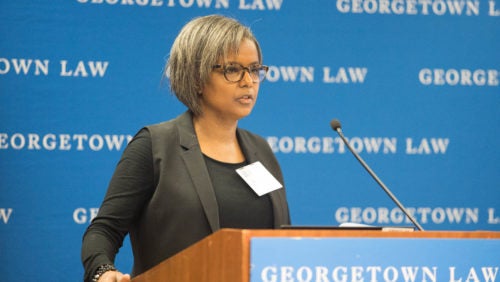Professor Sheila Foster: Celebrating the (Urban) Commons
October 16, 2018

Professor Sheila Foster at "Celebrating Commons Scholarship" on October 5.
“Celebrating Commons Scholarship” was the theme of a conference at Georgetown Law October 5-6, where scholars explored economics, inequality, stewardship, housing, development, the environment and more in the context of commons theory.
The two-day event brought together scholars and practitioners from around the globe to discuss the nuances, applications and critiques of Garrett Hardin’s famous 1968 article on “The Tragedy of the Commons.” The article, now 50 years old, spawned a body of eclectic scholarship challenging Hardin’s conclusion that shared resources must be privatized or heavily regulated in order to prevent their depletion.
In the 21st century, the notion of a “commons” has been expanded to include many kinds of shared resources including food and water supply, the global atmosphere, urban infrastructure, technology and software, and knowledge sharing. Commons scholarship today focuses less on the tragedies that result from shared resources and more on alternative ways that users communities come together to cooperatively utilize and sustainably manage shared resources to provide public benefits.
In the opening panel, Professor Sheila Foster described how she is applying the theory of the commons to her work on cities. “I argued in my early work that the same tragic tale can be told about cities, and different kinds of resources in cities,” she said. “Urban streets, parks, vacant land can mimic the tragedy of the commons that result from the self-interested actions of others…cities and their resources can become heavily congested, and resources strained and eventually diminished.”
There are problems, however, with importing the theory of the commons into cities: “To state the obvious, many kinds of urban resources, the infrastructure of the built environment, are quite different from traditional commons resources” such as depletable resources like forests and lakes, Foster said.
Cities are also heavily regulated (although Foster has also argued that the tragedies of urban commons arise as a result of regulatory slippage — weakly or poorly regulated space) and involve private actors as well. Further, the urban commons almost always raises issues of distribution and inequality.
But if there’s a “tragedy of the commons,” Foster says, scholars have noted there is also a “comedy,” where adding more people to resources results in more positive value: “We share, with recent work on the commons in the urban environment, a desire to push back on the standard understanding of the commons as a need to avert the tragedy…in a desire to identify alternative economic visions that have the potential to address historic levels of inequality and stratification, particularly in cities.”
Global Commons
The vibrant conference included nearly 80 participants from more than 20 different nations presenting more than papers on a wide variety of interdisciplinary and trans-disciplinary, topics. Case studies were presented from Barbados, Brazil, Indonesia, Sub-Saharan Africa, Italy, Poland, Israel, Hawaii, and beyond, with topics ranging from “Indigenous Perspectives in the Commons” to “Reconceiving the Commons” to “The New Commons: Outer Space, Cyberspace, and Beyond.”
Panelists applied the commons framework to water, food, the environment, technology, biodiversity and the media. A “Practitioner’s Workshop” on Day 2 focused on Community Land Trusts (CLTs), a legal tool increasingly used as a way to solve the affordable housing crisis in cities throughout the globe.
The conference was part of the kickoff for a global series of events sponsored by the International Association for the Study of the Commons and organized by Professor Foster and Brigham Daniels (Professor, Brigham Young University Law), with the support of doctoral fellow Chrystie Flournoy Swiney (J.D.,Ph.D. (ABD)).